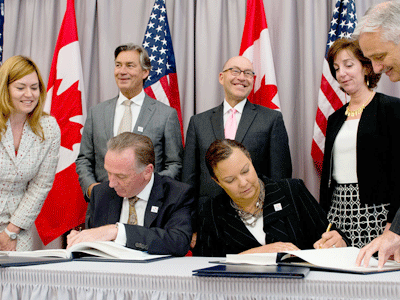 Environment Minister Peter Kent sign the updated Great Lakes Water Quality Agreement." width="400" height="300" />
Environment Minister Peter Kent sign the updated Great Lakes Water Quality Agreement." width="400" height="300" />The Great Lakes Water Quality Agreement (GLWQA) is a commitment between the United States and Canada to restore and protect the waters of the Great Lakes. The Agreement provides a framework for identifying binational priorities and implementing actions that improve water quality. EPA coordinates U.S. activities that fulfill the Agreement.
The U.S. and Canada first signed the Agreement in 1972. It was amended in 1983 and 1987. In 2012, it was updated to enhance water quality programs that ensure the “chemical, physical, and biological integrity” of the Great Lakes.
The 2012 agreement will facilitate United States and Canadian action on threats to Great Lakes water quality and includes strengthened measures to anticipate and prevent ecological harm. New provisions address aquatic invasive species, habitat degradation and the effects of climate change, and support continued work on existing threats to people’s health and the environment in the Great Lakes Basin such as harmful algae, toxic chemicals, and discharges from vessels.
 Environment Minister Peter Kent sign the updated Great Lakes Water Quality Agreement." width="400" height="300" />
Environment Minister Peter Kent sign the updated Great Lakes Water Quality Agreement." width="400" height="300" />